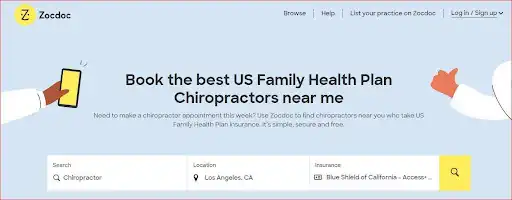Would you believe that only 1 in 5 Americans seek medical attention for an injury?
Understandably, you might feel no pain after an accident occurs. But, not all injuries are immediately apparent; some manifest days, weeks, or even months after.
That’s the scarier part of getting into an accident; injuries may be hidden and put you at greater risk if left undetected.
The good news is that you have healthcare professionals who could uncover masked injuries. They’re the chiropractors.
Should you go to a medical expert after the accident?
The answer is definitely yes. The type of healthcare practitioner, however, depends on your present condition. If you’re wounded and have multiple fractures, you must see a medical doctor. A chiropractor will be ideal if you’re bruised and experiencing body pain anywhere from your neck to your heels.
But what could be the reason for not seeking immediate medical attention after an accident?
Not knowing who pays for the medical treatment could be the biggest reason.
This article will help determine who pays for your chiropractor after an accident and answer whether chiropractic clinics accept insurance.
Personal Injury Protection (PIP) Insurance As An Alternative
In general, the driver or person who’s at fault in an accident pays the following:
- Medical bills
- Rehabilitation expenses
- Loss of income
- Property damage repairs
If you’re at the not-at-fault party, well and good, you’re entitled to the above. However, it’s ideal to consult a personal injury lawyer to preserve your rights and solidify your claim. But if you’re on the other end of the spectrum, your insurance will likely cover your expenses if not from your own pocket.
This is where Personal Injury Protection Insurance, or PIP, comes in handy.
PIP, also known as “no-fault insurance,” pays your medical bills and expenses related to your injury and accident, whether at fault or not.
PIP, however, is only available in States where a no-fault insurance policy is mandated:
- Arkansas
- Delaware
- Florida
- Hawaii
- Kansas
- Kentucky
- Maryland
- Massachusetts
- Michigan
- Minnesota
- New Jersey
- New York
- North Dakota
- Oregon
- Pennsylvania
- Texas
- Utah
- Washington
If you’re located outside these 18 States, the at-fault party’s insurance company pays for all the expenses in the event of an accident.
PIP is a must-have, even for defensive drivers. Because accidents can strike anytime, anywhere, and to anyone.
This no-fault insurance, however, has limitations just like any other insurance. It only has a ceiling of $10,000 covering expenses. Should the total cost exceed, whether medical or property damages, a plan upgrade is an option.
Like other insurance, proper documentation is needed for a PIP claim, including medical bills, wage statements, car repair quotations, and even the police report.
Determining Fault In An Accident
Determining who’s at fault in an accident is way more complex than the “You hit my car. So, you’re at fault.” blaming game.
It involves different parties, such as yourself, the other driver, the police, the insurance companies, the medical expert, the witnesses, and your personal injury lawyer.
But primarily, it’s the insurance companies, with the assistance of the police, who take the most time in this process until they come up with the findings and resolution.
Locations, scenarios, and degree of negligence play significant factors in determining who’s at fault. It’s not always the rear-ended party who’s not at fault. For example, a speeding car hits you while you’re trying to head out from a parallel parking position.
At first impression, you blame the speeding car driver for hitting you. But the scenario tells otherwise, as you didn’t take caution or a look in your side mirror before heading out. This situation suggests to the insurance companies or even the police that both of you are at fault, and the percentage of coverage for damages will be immediately decided.
While waiting for the release of the findings, it’s recommended that you determine your injury, as this will add to your total compensation if medically verified.
Neck and back injuries are the usual injuries sustained after a car accident or any vehicular mishaps. If you ever feel soreness, tightness, or swelling in the back or significantly lower back area, consult a chiropractor and an attorney for back injury cases.
Once the findings are out on who’s at fault or who pays the most, it’s recommended to seek advice from a car accident or personal lawyer and let them handle the case. Should you be in the not-at-fault position, expect to receive a call from the other party’s insurance company for a settlement offer.
If this happens, do not jump into any offer, regardless of the amount. Let your lawyer do the work because they know how to handle and maximize your compensation.
Any words you share with the other party could also be used against you and might put you at fault. So, staying silent and leaving everything to your lawyer is best.
Chiropractic Care Using Third-Party Liability Claim
Another reason for not seeking chiropractic help after an accident is not knowing if chiropractors accept insurance. This reason is valid because patients’ initial perception when seeking medical assistance for an injury is to go to a medical doctor.
Many people are still not convinced that alternative medicine works and that chiropractic care helps treat injuries such as whiplash and back and neck pain, which are usually sustained in a car accident. As proof, a study concludes that chiropractic care effectively treats acute neck pain.
To answer whether chiropractors accept insurance, they do. The vast majority of insurance companies partner with thousands of chiropractic clinics nationwide.
Zoc doc is a way to search for chiropractic clinics that accept insurance. You can visit their website: https://www.zocdoc.com/chiropractors/us-family-health-plan-414m. All you need to do is provide your location and your insurance provider.

You can seek chiropractic treatments using the party at fault’s insurance, which is called a third-party liability claim. A third-party liability claim is insurance that protects you from financial responsibilities if you accidentally hurt someone or damage someone else’s property. Most insurance covers rehabilitative programs for car accident patients, while wellness treatments are already out of their coverage.
Remember that the chiropractic care coverage depends on the insurance plan. So, it’s best to maintain good communication between yourself, your chiropractor, and the third-party insurance company about the amount of coverage.
In filing for a chiropractic treatment claim, ensure all the documents provided by the insurance company, including the police report, are on hand to avoid any inconvenience.
Workers’ Compensation For Chiropractic Treatment
Injuries are not just common on the roads; they are prevalent on work premises, too. The worker’s compensation law protects all employees against injury, disability, or even death.
Should you happen to sustain an injury inside your workplace while on duty, let’s say a forklift has bumped you, you can visit a chiropractor for treatment sessions, and your company will pay for you. Workers’ compensation insurance has benefits similar to those of any life, health, and accident insurance.
Despite working outside the company premises, employees who are usually in the field can also file for workers’ compensation insurance in case of accidents. Delivery personnel are some of the in-field employees who’ll benefit from worker’s compensation insurance as they’re on the road most of the time.
Under worker’s compensation law, the company’s human resource staff must file all the necessary documents for your chiropractic care or other medical insurance claims.
Conclusion
Car accidents can happen anytime, anywhere, and to anyone. It’s always best to have insurance to protect yourself from physical, financial, and medical liabilities.
Chiropractic care is one of the best options for managing common injuries sustained in car accidents because of its natural approach and fast healing results. The majority of chiropractic clinics accept insurance claims. Therefore, delaying any treatment to avoid injury complications is not an excuse.
PIP, third-party liability claims, and worker’s compensation insurance are just some ways to cover your chiropractic rehabilitation program. Regardless of the payment method, seeking medical attention after an accident is always best because overall well-being must be prioritized.
It’s also recommended that you consult a personal injury lawyer to guide you through the complex insurance claim process and get a just settlement.



